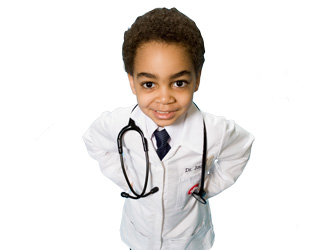Although most thyroid nodules in children are benign, approximately one-fourth are thyroid cancer. Certain characteristics of a nodule, including its size, shape, and appearance, increase its likelihood of being thyroid cancer. Additionally, some children have an increased risk of developing thyroid nodules and thyroid cancer. For this reason, all thyroid nodules in children should be evaluated by a pediatric endocrinologist. Our pediatric endocrinologists work closely with Duke pediatric oncologists, radiation oncologists, and geneticists to identify and follow children who are at higher risk for thyroid cancer for medical or genetic reasons. Types of thyroid cancer and risk factors for thyroid cancer include the following:
Papillary Thyroid Cancer
This is the most common type of thyroid cancer in children. It may spread to the lymph nodes or, less commonly, to the lungs, but is highly treatable if detected early and treated effectively.
Follicular Thyroid Cancer
Follicular thyroid cancer is the second most common type of thyroid cancer in children. It can spread to lymph nodes as well as other organs. This type of cancer can be cured when identified and treated early.
Medullary Thyroid Cancer
In children, medullary thyroid cancer is typically caused by an inherited syndrome called multiple endocrine neoplasia type 2 (MEN2). Medullary thyroid cancer is a serious form of thyroid cancer and can be harder to treat when it spreads beyond the thyroid gland. For this reason, many children with MEN2 have their thyroid glands removed before cancer develops. If MEN2 runs in a family, all family members, including children, should have genetic testing to determine if they are affected. If MEN2 is suspected or confirmed in a child, they should see a pediatric endocrinologist.
Genetic Conditions
MEN2, DICER1 syndrome, familial adenomatous polyposis (FAP), Gardner syndrome, Carney complex, Werner syndrome, and PTEN hamartoma tumor syndrome are some genetic conditions associated with thyroid nodules and thyroid cancer. We work closely with Duke's pediatric geneticists to identify children at risk.
Thyroid Cancer Following Radiation Treatment
Children and adolescents who have received radiation to the head, neck, and chest to treat a different type of cancer have an increased risk for thyroid cancer.


